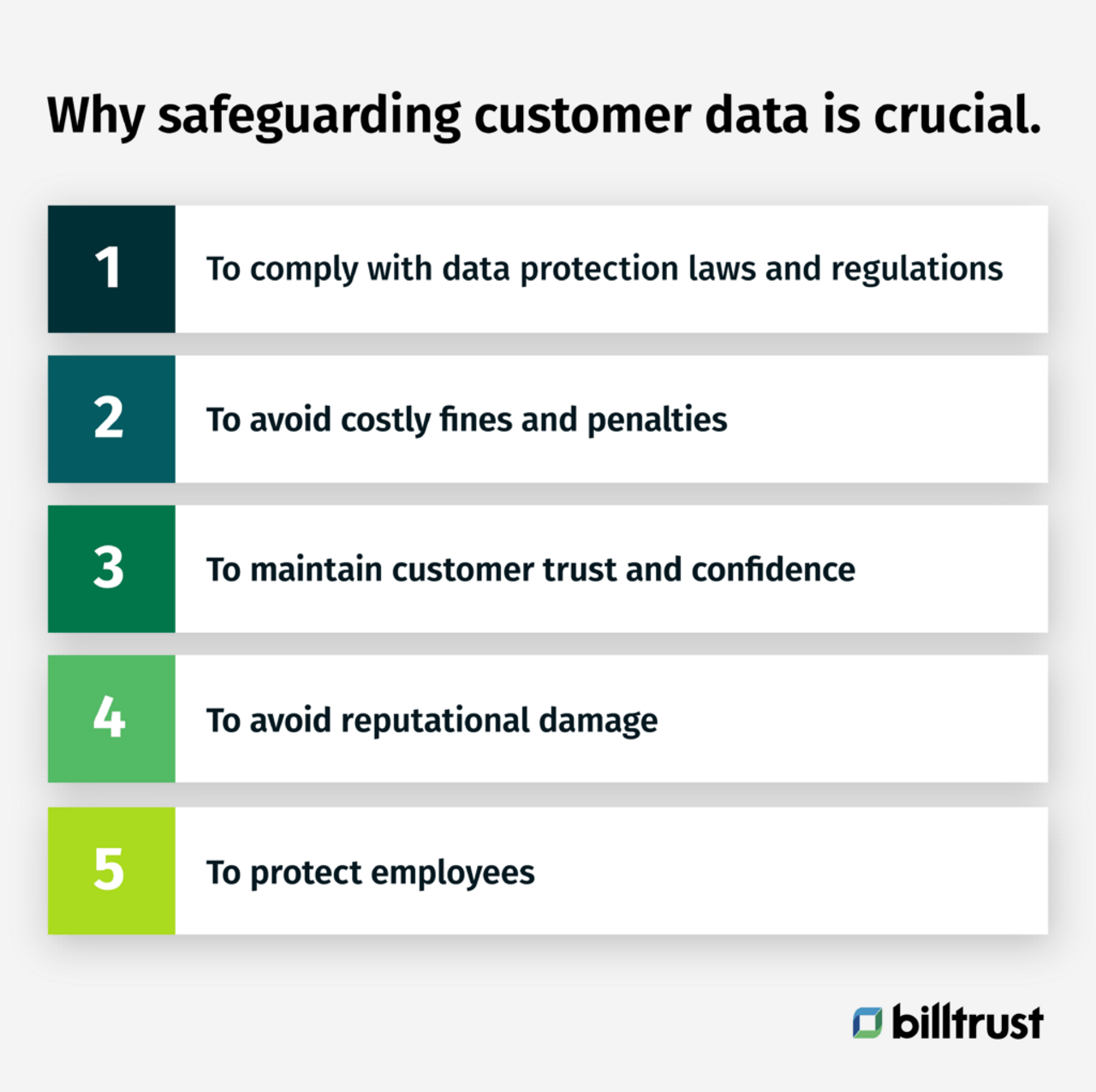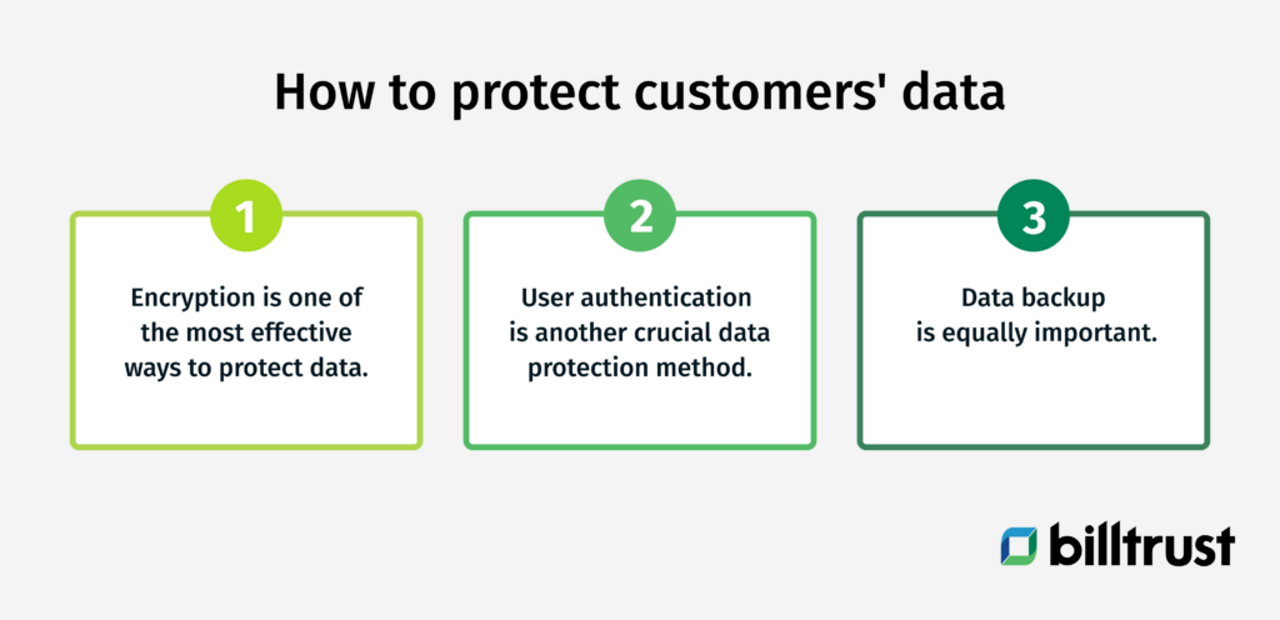Protecting your customer data with technology
Blog | September 12, 2022
Reading time: 6 minLearn why you should use technology when safeguarding your customer data, how it can be used for various industries, and the best practices.
Learn why you should use technology when safeguarding your customer data, how it can be used for various industries, and the best practices.
If there's one thing that all business owners can agree on, it's the importance of protecting customer data. Keeping your consumers' information safe has never been more essential in this digital era. Fortunately, technology provides a host of solutions for doing just that. Below is our comprehensive guide to safeguarding your customer data using technology.
Protecting customer data is more critical in today's digital age. With so much of our personal information shared online, companies must take steps to secure our data. After all, if consumer data falls into the wrong hands, it can lead to identity theft, payment fraud, or other malicious activities.
There are several other reasons why safeguarding customer data is so important:
In many countries, the law requires businesses to protect their customers' data. These laws and regulations vary from country to country, but they all aim to keep people's information safe.
If you fail to comply with data protection laws, you could be subject to hefty fines and penalties. In the European Union, for example, companies can be fined up to 4% of their global annual revenue for violating the General Data Protection Regulation (GDPR).
If your customers don't trust you to keep their data safe, they're unlikely to do business with you. A recent Business Wire study found that 86% of consumers say they would take their business elsewhere if a company had just a couple of bad customer experiences with that brand.
Data breaches can damage your company's reputation, even if you're not at fault. If customers lose trust in your ability to protect their data, they may stop doing business with you, and your brand loyalty could suffer.
Employees are often the weak link in the data security chain. If your employees' data is compromised, they could risk identity theft, fraud, or other malicious activities.

There are many ways that customer data can be compromised, including the following:
A data breach is when an unauthorized person gains access to sensitive data. This can happen through hacking, phishing or other means. Once a data breach occurs, the attacker can sell the stolen data on the black market or use it for identity theft, fraud or other malicious activities.
Malware is a type of software designed to damage or disable computers. It can steal data, delete files or even take control of a computer. Sometimes, malware installs on a computer without the user's knowledge or consent.
An insider threat is when an employee, contractor, or third-party vendor intentionally or unintentionally risks your company's data. This can happen through carelessness, error, or malicious intent.
Fortunately, there are some ways that you can protect customer data. For example, you can encrypt data in transit, restrict access to only authorized personnel and regularly back up data to prevent loss. Taking these precautions can help ensure that customer data remains safe and secure.
As our lives move increasingly online, businesses are collecting more data about their customers than ever. This data can include everything from contact information and purchase history to sensitive details like health records and financial data. With the amount of data collected, businesses must take steps to protect their customers' information.
While it may vary from business to business, it is the company's responsibility to ensure that customer data is secure. This means encrypting data, implementing strict access controls, and regularly backing up files. By taking these precautions, businesses can help to safeguard their customers' data and maintain their trust.
Additionally, businesses that protect customer data are more likely to build trust with their customers. When customers know their data is safe, they will likely do business with the company again. Therefore, protecting customer data is crucial for preventing malicious activities and building long-term customer relationships.

Regarding customer information, the question is not if it needs to be secure but how best to secure it. After all, no company wants to be responsible for a data breach that results in the loss of sensitive information.
So what kind of customer information needs to be kept safe?
By taking steps to secure all of this sensitive information, you can help keep your customers safe from harm.
Customer confidentiality is one of those things that's difficult to define. After all, when does customer information become confidential? Is it when a customer provides their name and contact information? Or is it when they share sensitive financial or health information?
The answer, of course, is that it depends.
In general, breaching customer confidentiality happens when there is a legal obligation to do so, such as in the case of criminal activity or when disclosure is necessary to protect the customer or others from harm. However, even in these cases, businesses must only disclose the minimum required amount of information and respect the customer's right to privacy.
There are a few other situations where confidentiality may be breached, such as when the customer gives their consent or when the law requires disclosure.
Business leaders must decide when and how to breach customer confidentiality. However, it's essential to remember that disclosing it should be made with the customer's best interests in mind. Customer confidentiality is tricky and you must get it right. By taking the time to understand the ins and outs, you can ensure that you always act in the best interests of customers.
There are many ways to protect your customers' data, but some of the most common include encryption, user authentication, and data backup.
By taking these measures, you can help to ensure that their customers' information is safe from hackers and other malicious actors:

Safeguarding customer data is essential for any business that wants to build long-term relationships with its customers. You can help keep your customers safe from harm by taking steps to secure sensitive information. In addition, by respecting customer confidentiality, you can show your commitment to protecting your customers’ privacy. Ultimately, safeguarding customer data is the right thing to do and is good for business.